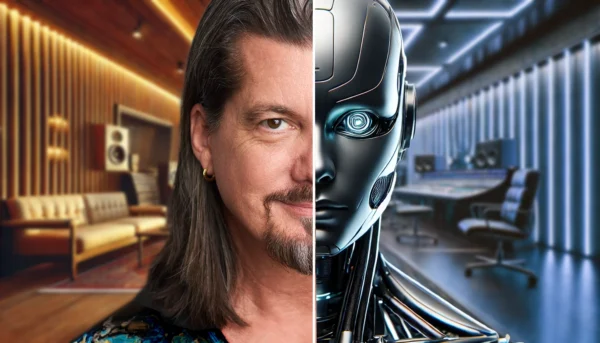A Letter to the Aspiring voice actor
Voice acting is a unique and fulfilling career that offers a multitude of opportunities across various sectors. Whether you dream of being the voice behind an animated character, narrating audiobooks, or lending your voice to video games, the possible paths to becoming a successful voice actor are diverse and becoming more challenging. In this letter to aspiring voice actors, I’ll explore the different sectors of the voice over industry, providing insights based on current trends and expert opinions found using AI and then offer my non-AI generated opinion.
The State of Voice Over with Artificial Intelligence
Artificial Intelligence (AI) is revolutionizing the voiceover industry, bringing both opportunities and challenges for professionals. While AI voices are becoming more realistic, they still struggle to match the emotional depth and nuance that human voice actors provide. According to Chicoine from Backstage, AI voices cannot yet replicate the high-quality performances of experienced human talents, which are essential for nuanced and emotionally rich projects (Backstage).
Rolf Veldman, CEO of Voice123, highlights the potential of AI to streamline the casting process by allowing instant script previews in desired voices, although collaboration between human creatives remains crucial (Backstage). AI’s role is also expanding in various sectors, including automated customer service and digital assistants, where consistency and brand-specific voices are in high demand (MIT Technology Review).
The benefits of AI-driven voiceovers include time efficiency, cost savings, and scalability. AI can produce professional voice overs in a fraction of the time and cost required by traditional methods, enabling businesses to quickly adapt to market trends and expand their reach globally (Murf.ai).
However, there are significant challenges and ethical concerns. AI struggles with lip synchronization, emotional depth, and cultural nuances, which can affect the authenticity of the voiceover. Additionally, issues of job displacement and fair compensation for human voice actors remain pressing concerns (VerboLabs).
Despite these challenges, the future of AI in voiceover looks promising. Advancements in neural text-to-speech technology and voice cloning are pushing the boundaries of what synthetic voices can achieve, making them nearly indistinguishable from human voices in some cases. As AI technology continues to evolve, it is expected to offer even more natural-sounding and emotionally intelligent voiceovers (Speechify).
Voice Over in Commercials
Voice overs in commercials have traditionally been one of the most common and lucrative areas of voice acting. Commercial voice actors lend their voices to advertisements on television, radio, and online platforms.
Current Trends
Recent trends in commercial voice overs have indicated a preference for natural and relatable voices. Brands have been moving away from the traditional announcer style and opting for voices that sound more conversational and authentic. However, the industry is rapidly evolving with the introduction of AI technologies.
Current Challenges
The commercial voice over industry is highly competitive and facing significant disruption. Aspiring voice actors must not only hone their skills and develop a unique voice but also stay ahead of technological advancements that are reshaping the industry.
Current Opportunities
While advancements in AI and voice synthesis are transforming the commercial voice over landscape, there may still be opportunities for voice actors who can provide unique value or adapt to new roles within the changing industry.
From D.C. Douglas’s Butt
Unfortunately, commercials have been going more nonunion since the pandemic. It used to be that 70% were union and 30% were nonunion. Now it’s inverted. Some agencies barely get any commercial auditions coming through. Part of that is due to union negotiations that didn’t necessarily protect the actor as one would hope. It left loopholes and disincentives.< Additionally, something that was good for some and bad for others was the democratization of the voice over field via the internet. The industry finally caught up with technology, and the concept of recording people remotely was no longer considered cumbersome or ineffective. That idea, combined with the demise of voicebank.net (which was bought out by Voices.com, gutted of its original use and then remonetized to such a ridiculous point that agencies abandoned it) has broadened the voice actor base so wide and far that there are too many voice actors for the number of jobs available. And we haven’t even begun to mention AI!
What I think will possibly happen is that low budget nonunion jobs will primarily go to AI. Because the needs are easily met even now with the state of the technology. And in two years, the voice technology will be difficult to tell from a real human. The price point will be so low and the customization so easy that those low budget commercials will not need a human being.
The same could be said for some union spots. Those would then also become nonunion as there’s no reason for the union to be involved when you’re not using a trained actor. So that leaves the bigger budget campaigns. Here’s where it gets tricky. Some celebrities will have their voices cloned and will sell the cloned voices for a royalty fee. The union is trying to get a piece of that and may offer some protections. But now you have, say, McDonald’s or AT&T wanting, say, Kiefer Sutherland or Jennifer Aniston to be the voice of their campaign. They could pay a few million for the actual actor or they could just pay the royalty fee for their cloned voice at a substantially reduced rate. This would set off a race to the bottom and most definitely push out non-famous human voice actors.
Even in the worst-case scenario, there will always be some humans being hired in the future. But in the coming few years, we are going to witness that wide base of voice actors around the nation slowly be squeezed out of the business as AI voice clones begin their tight grip on commercials.
Voice Over in Promos
Promo voice overs involve creating short, engaging clips to promote upcoming TV shows, movies, events, or products. Promo voice actors need to convey excitement and urgency to grab the audience’s attention.
Current Trends
The promo industry has been evolving with the rise of streaming platforms. Traditional TV promos are being complemented by promos for digital content on platforms like Netflix, Hulu, and Amazon Prime. However, the increasing role of AI and automated systems is beginning to impact this sector.
Current Challenges
Promo voice overs require a high level of energy and versatility. The ability to quickly adapt to different styles and tones is essential. Additionally, voice actors in this field must now compete with rapidly advancing AI technologies.
Current Opportunities
While the increasing number of streaming services and digital content creators has meant growing demand for promo content, the nature of opportunities for human voice actors may be changing due to technological advancements.
From D.C. Douglas’s Butt
Promos will definitely mostly go to AI voices since promos are needed daily and often change within a day. No longer will they need a voice actor with their travel rig being able to send voice overs anytime of day or night. They’ll simply go to the website, change the text, and hit a button. Unless the promos are supposed to feature the voice of the actors involved in the film or show, it’s highly doubtful human promo voice over actors will be needed.
Voice Over in Live Action ADR
Automated Dialogue Replacement (ADR) is used in live-action films and TV shows to re-record dialogue that was not captured perfectly during filming. voice actors must match the timing, tone, and emotion of the original performance.
Current Trends
The rise of international co-productions has increased the demand for ADR. However, emerging technologies, including AI-driven voice synthesis and translation, are beginning to impact this field significantly.
Current Challenges
ADR requires precision and the ability to mimic the original performance closely. It is a technical skill that requires practice and experience. The growing capabilities of AI in replicating and translating voices pose a significant challenge to human voice actors in this area.
Current Opportunities
While globalization of the entertainment industry has traditionally grown ADR work, the future landscape of opportunities may look different as technology continues to advance.
From D.C. Douglas’s Butt
ADR voice actors are the street lamplighters and electricity has just come to town. Currently, AI technology can voice clone the actor in a show or movie and translate it to any language needed as well as alter frame by frame the lips and jaw movement so that it matches the translated voice. For the viewer, it will be a huge improvement. For the ADR voice actor, it will mean unemployment if that’s the only VO work they usually do.
Voice Over in Audiobooks
The audiobook industry has seen significant growth in recent years. voice actors narrate books, bringing stories to life for listeners. This sector requires excellent storytelling abilities and the ability to portray multiple characters.
Current Trends
The popularity of audiobooks continues to rise, driven by the convenience of listening on the go. Genres like self-help, fantasy, and crime thrillers are particularly popular in the audiobook market. However, the integration of AI technologies in audiobook production is beginning to impact the industry.
Current Challenges
Audiobook narration is time-consuming and requires a lot of stamina. voice actors need to maintain consistency in their performance over long recording sessions. The growing sophistication of AI-generated voices presents a significant challenge to human narrators.
Current Opportunities
While the expanding audiobook market has traditionally offered numerous opportunities for voice actors, the landscape is changing. The role of human narrators may evolve as AI technologies become more prevalent in audiobook production.
From D.C. Douglas’s Butt
Audiobooks will go on a similar path as commercials, only I truly think the number of humans doing that work will be very rare. The cost benefit of going to AI is just too good. And if you want a celebrity, you’ll most likely just pay the royalty fee for the cloned voice. Even in the audiobook world, actors who are now famous for just doing those will most likely resort to cloning their voices so that they can compete.
Voice Over in Anime Dubbing
Anime dubbing involves translating and recording voices for anime shows and movies originally produced in a different language. voice actors must match the lip movements and emotional tone of the characters.
Current Trends
Anime continues to gain popularity worldwide, with streaming platforms like Crunchyroll and Netflix adding more anime titles to their libraries. This growth fuels the demand for skilled voice actors in dubbing.
Current Challenges
Dubbing requires precise timing and the ability to convey the same emotions as the original actors. It is a challenging but rewarding field for those who master it.
Current Opportunities
As anime’s popularity grows, so does the need for talented voice actors. Opportunities exist not only in traditional anime but also in web series and independent projects.
From D.C. Douglas’s Butt
Anime dubbing, like live-action ADR, may suffer the same fate. However, a part of me thinks that the performance style and sensibilities of the voices are a bit more extreme from Japanese to English than live-action Japanese to English. In this scenario, it might be a little more complicated to prompt the performance differences one needs. So actors may still be needed in this field. But again, it’s about budget. And a lot of low-budget localizing of anime will definitely go the AI route.
Voice Over in Cartoons
Voice acting for cartoons involves creating voices for animated characters. This sector offers a wide range of opportunities, from children’s shows to adult animation.
Current Trends
There is a growing demand for diverse and unique voices in the animation industry. Shows are increasingly featuring characters from different backgrounds and cultures, requiring voice actors who can bring authenticity to these roles.
Current Challenges
Cartoon voice acting often requires a high level of creativity and the ability to perform exaggerated expressions and voices. It can be physically demanding and requires versatility.
Current Opportunities
The animation industry is expanding with the rise of new streaming platforms and an increase in original content. voice actors with distinctive and versatile voices are in high demand.
From D.C. Douglas’s Butt
Cartoons may very well be one of the safe areas for human voice actors. The kind of idiosyncratic and spontaneous creativity needed cannot be programmed or prompted with AI currently. In the future, an aspect of that will be involved, but still, there’s no way to match that of human beings. Perhaps I’m just being Pollyannish in this scenario.
Voice Over in Video Games
Video game voice acting involves voicing characters in video games. This sector has grown significantly with the rise of AAA games and indie games, offering diverse roles for voice actors.
Current Trends
Video games are becoming more cinematic, requiring voice actors to deliver performances on par with film and television. Motion capture technology is also being used, blending physical acting with voice acting. Simultaneously, AI and voice cloning technologies are beginning to play a role in game development.
Current Challenges
Video game voice acting can be intense and physically demanding, especially for action-oriented games. Actors often need to perform vocalizations for fighting, running, and other strenuous activities. The integration of AI technologies presents new challenges for voice actors in this field.
Current Opportunities
The booming video game industry continues to offer opportunities for voice actors, though the nature of these opportunities may change. As AI technologies advance, the role of human voice actors in video games may evolve, potentially focusing more on initial character establishment rather than ongoing dialogue.
From D.C. Douglas’s Butt
Video games, out of everything, I think will be the most balanced between AI and voice over. They will use human voice actors to establish the characters, whether they are leads or NPCs. But then all actors involved will have to consent to having their performances cloned so that players can have ongoing conversations for hours with those characters. So while video game voice over work will not disappear, the possibility of additional sessions and pickups and even potentially DLCs and sequels may be gone.
D.C’s Final Thoughts From His Butt
I’ll admit, after writing all this out and looking at it, I sound pretty damn pessimistic.
In truth, I love the possibilities of artificial intelligence. The strides that the human race will make in biotech and environmental areas will be game-changing. In education, it will hopefully save this upcoming generation from the bullshit “teach the bible in schools” MAGA crowd. And the ability to have AI help everyone use critical thinking when slogging through the cultural slum known as social media will be priceless. But it’s hard not to acknowledge that the art of voice acting is going to take a huge hit. I’m at a stage in my career where in 10 years, I may not care as much because I’ll have Social Security and my pension and hopefully, if I can get my shit together, a pretty good portfolio on the stock market! Lol! So that leads me to the real reason I wanted to write this post with huge help from AI.< And that is this – a message to the aspiring voice actor:
Diversify.
Many of the younger voice actors who want to start a career have entered into this field directly from “GO,” they didn’t pass through acting classes or theater. While it’s possible to have a career in voice over without formal acting training (just learning voice/mic technique), acting classes and theater experience can make you a more versatile performer. In the age of AI, where recorded voice work is increasingly vulnerable, live performance skills may provide a crucial advantage. Live voice acting, improvisation, and theater are areas where human creativity and spontaneity are likely to remain valued and difficult for AI to replicate. This also extends to film and TV (extras and creatures notwithstanding.)
That’s just one idea represented by “diversify.” Another is this: anticipate where else human voices would be wanted and considered better than AI. Position yourself to take advantage of that. It’s a vague statement, but it’s no different than telling somebody in 2010 to think about how they could monetize their home YouTube videos or streaming themselves playing a video game.
I also think that in 20 to 30 years from now, the pendulum will have swung back to embracing more human voices coming through the hologram or whatever the hell medium we’re using then. Humans always get hypnotized by the glittering things they create until they wake up and realize they’re actually bored and feeling a certain emptiness because they’ve become disconnected from their tribe.
At least, that’s my hope. Good luck.
If you read this far, you might be interested in these:
VO: MENTORS & INFLUENCES
BEGINNERS VO GUIDE
ADVICE FOR DISABLED/NEURODIVERGENT ACTORS
PIONEERING DISABLED/NEURODIVERGENT ACTORS








